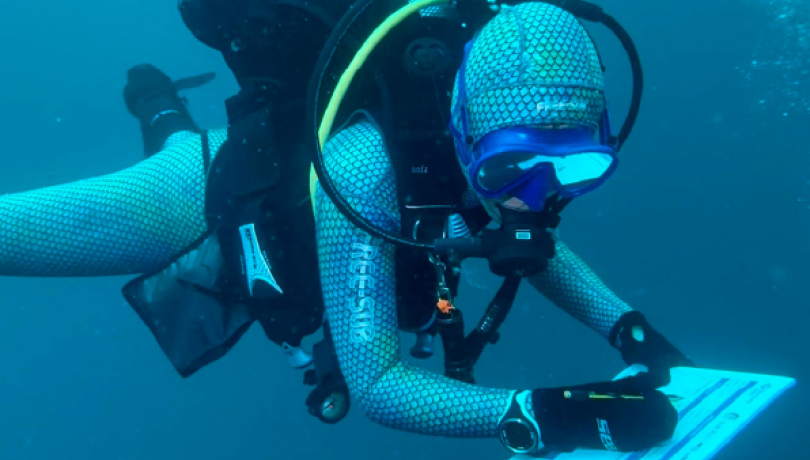The “OdM Climate 2024” initiative, launched by the ICM through the citizen science platform Observadores del Mar, has revealed an increase in warm-water species along the Spanish coast, among other effects linked to global warming.

The Mediterranean Sea is undergoing an unprecedented transformation due to global warming, leaving a clear mark on its waters. Species typical of warm climates are migrating further north, corals are dying from thermal stress, jellyfish are appearing earlier than usual, and Posidonia seagrass meadows are showing signs of exhaustion. All of this has been documented thanks to “OdM Climate 2024”, an ambitious citizen science initiative promoted by the Observadores del Mar platform. “OdM Climate 2024” has established a monitoring network in the Mediterranean to gather information on climate change indicators related to jellyfish, corals, fish, and Posidonia seagrass meadows.
“‘OdM Climate 2024’ has been key to expanding our understanding of the effects of climate change on marine ecosystems and help us better understand what is happening and how to respond,” explain the initiative’s coordinators from ICM, who celebrate its ability to generate thousands of records that reflect the current state of the Spanish Mediterranean.
With more than 1,400 underwater surveys, 40,000 records of marine organisms, and the participation of over 500 people and 33 diving centers, “OdM Climate 2024” has established itself as a key monitoring network for taking the pulse of climate change in the Mediterranean. Furthermore, the initiative has been recognized with the secondary award in the 3rd CSIC Awards for Scientific Communication and Citizen Science, as well as an honorable mention in the European Union Prize for Citizen Science 2025.
An increasingly tropical Mediterranean
One of the most notable findings of the 2024 edition has been the tropicalization of marine fauna. The project “Fish and Warming,” led by researchers Ernesto Azzurro and Enrico Cecapolli (IRBIM-CNR), has identified a significant increase in thermophilic species—that is, species that prefer warm temperatures—in the waters of the western Mediterranean. In areas such as the coast of Granada, the tropicalization index reaches 35%, in line with the high temperatures recorded.
Among the most representative species of this trend are Thalassoma pavo and Sparisoma cretense (Mediterranean parrotfish). The latter, historically confined to the eastern Mediterranean and North African waters, has been sighted for the first time in the Balearic Islands and Almería, confirming its westward expansion. These changes reflect the direct impact of ocean warming on marine biodiversity.
More visible changes: jellyfish, corals, and Posidonia
In addition to fish, other key species are showing responses to rising temperatures. The team led by Macarena Marambio (ICM-CSIC), through the project “Jellyfish Alert,” has documented early blooms of Cotylorhiza tuberculata in the Region of Murcia. Adult individuals of this species were observed in large numbers much earlier than expected, which could be a sign of an earlier reproductive cycle, likely linked to warming waters.
Meanwhile, the project “Coral Watch,” led by Joaquim Garrabou (ICM-CSIC), has revealed a high level of impact on gorgonians and corals. More than 70% of the surveys indicate moderate to severe effects from mass mortality events. The most affected species are Paramuricea clavata and Eunicella singularis, while the sponge Chondrosia reniformis appears to be more resilient.
As for the Posidonia oceanica seagrass meadows—crucial to the health of the Mediterranean ecosystem—2024 was a year without notable flowering, unlike what was observed after the intense heatwaves of 2022. According to the team led by Fiona Tomás (IMEDEA-CSIC-UIB), this could be due to lower thermal stress or the fact that the plants have not yet recovered enough resources after the major reproductive effort of that year. Paradoxically, the most intense flowering in 2024 was observed in northern Catalonia, a region known for its cold coastal climate.
“OdM Climate 2024 has not only generated valuable data for scientific research, but it has also demonstrated the transformative potential of citizen science. Volunteers, recreational and professional divers, together with scientific teams, have contributed to generating rigorous and useful knowledge to understand how our sea is changing,” explains Macarena Marambio.
“To ensure the data is more robust, it’s important to maintain the effort over time so that long-term trends can be observed. That’s why this year OdM Climate is active again, and we invite anyone interested to participate in the 2025 edition,” she concludes.
The full data from the initiative—developed thanks to funding from the Fundación Biodiversidad, under the Call for Proposals to implement the National Climate Change Adaptation Plan (2021–2030) of the Ministry for the Ecological Transition and the Demographic Challenge—is available at DigitalCSIC, and registration for the next edition, OdM Climate 2025., is now open.
About Observadores del Mar
Observadores del Mar is a marine citizen science platform grounded in solid scientific knowledge. It is coordinated by several marine research centers of the CSIC: the Institute of Marine Sciences (ICM), the Spanish Institute of Oceanography (IEO), the Blanes Center for Advanced Studies (CEAB), the Mediterranean Institute for Advanced Studies (IMEDEA), the Balearic Islands Coastal Observing and Forecasting System (SOCIB), and the Institute of Marine Research (IIM).
In addition, it is a partner of the LIFE INTEMARES project, coordinated by the Fundación Biodiversidad of the Ministry for the Ecological Transition and the Demographic Challenge. It is supported by the CSIC’s PTI Ocean+, funded by the European Union – Next Generation EU – as part of the Spanish Recovery, Transformation, and Resilience Plan (MITECO program). It also maintains a partnership with the Marilles Foundation in the Balearic Islands and an active collaboration with RedPromar in the Canary Islands.